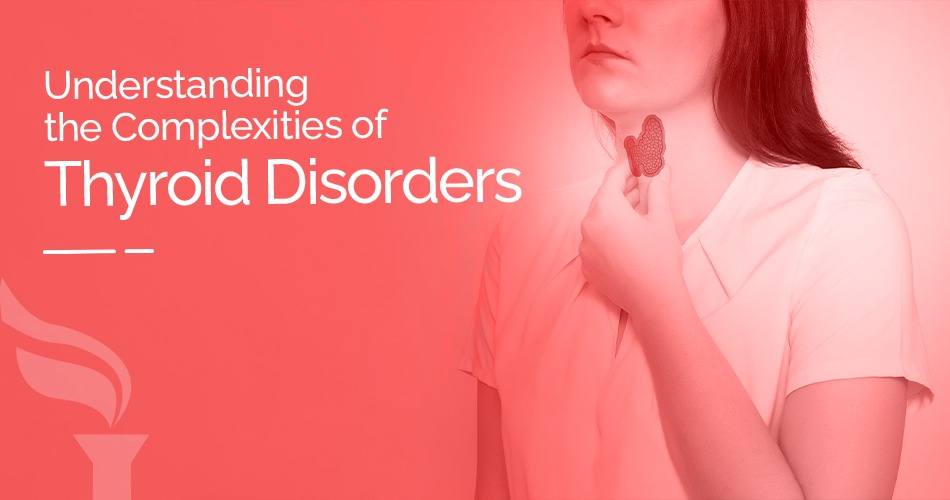Finding Balance: Navigating Thyroid Disorders for Optimal Health
Jun 16, 2023

The thyroid is a butterfly-shaped gland located near the throat, which is a crucial part of the endocrine system responsible for producing and releasing certain hormones. It also plays a pivotal role in regulating the body's metabolism. Triiodothyronine (T3) and Thyroxine (T4) are central systems of the thyroid gland that help in the effective regulation of our body’s energy.
Problems with the thyroid can affect your entire body. In this blog, we’ll shed light on the causes, symptoms, prevention, and potential treatment of thyroid disease.
What are T3 and T4 hormones?
T3 and T4 are major hormones present in the thyroid that effectively function to regulate the body’s overall energy and metabolism.
The T3 hormone is further categorized into two forms:
- Bound T3 – attached to protein
- Free T3 – attached to nothing
T4 majorly flows through tissues and determines the levels of thyroid in the body.
It is found in two forms:
- Free T4: Enters the body through tissues
- Bound T4: Attaches itself to certain proteins and does not enter tissues.
What are the effects of T3 and T4 hormones?
The T3 & T4 hormones present in your body affect your body in the following ways:
Organ development in the body: These hormones are essential for appropriate tissue and organ growth and development, especially throughout infancy and childhood. They have an impact on bone growth, brain development, and reproductive system maturation.
Maintaining desired body temperature: T3 and T4 are involved in the regulation of body temperature. They aid in keeping the body's core temperature within acceptable limits.
T4 are involved in the regulation of body temperature. They aid in keeping the body's core temperature within acceptable limits.
Regulates Heart rate and blood pressure: Thyroid hormones affect the function of the heart and the neurological system as they aid in the regulation of heart rate and blood pressure, as well as the proper functioning of the brain and nerves.
What causes thyroid disorder?
A thyroid disorder gets diagnosed when there is an excessive or insufficient amount of thyroid hormone in your body.
When the immune system mistakenly invades the thyroid gland, it creates an imbalance, resulting in autoimmune disorders, such as Hashimoto's thyroiditis (which causes hypothyroidism) and Graves' disease (which causes hyperthyroidism). Lack of iodine, a mineral required for thyroid hormone production, can result in thyroid diseases, particularly hypothyroidism.
What are the symptoms of a thyroid disorder?
Thyroid disorder symptoms vary depending on whether there is an excess or deficit of thyroid hormones in the report. The typical symptoms include:
- Tiredness and weakness
- Cold sensitivity
- Dry skin and hair
- Depression
- Memory issues
- Increased heart rate
- Weight loss or gain
- Heat intolerance
- Tremors
- Anxiety and irritability
- Sleeping difficulties
How to prevent thyroid-related diseases?
Well-balanced diet: A well-balanced diet in iodine, selenium, and zinc, all of which are necessary for thyroid function, can help prevent thyroid problems.
These nutrients can be found in foods such as seafood, dairy products, almonds, and whole grains.
Daily physical activity: Pushing yourself towards fitness is the ideal way to lead a healthy life as it supports overall body and thyroid functioning.
Stress Management: Thyroid hormone equilibrium can get disrupted by chronic stress. Stress management practises such as meditation, yoga, and counselling can prove effective.
Conclusion
Regular check-ups are mandatory to ascertain your thyroid levels and avoid its serious effects. At Apollo Diagnostics, we help you keep a check on your health; all you need to do is book an appointment. We also offer doorstep sample collection to make sample collection convenient.
Related Blog Post
Blog Categories
- Child Health
- Mens Health
- Women's Health
- Mental Health
- Health Myths & Facts
- Fitness
- Nutrition/Recipes
- Remedies
- Weight Management
- Stress Management
- Health Supplements
- Addiction Management
- Disease Management
- Allergy
- Anemia
- Arthritis
- Asthma
- Autoimmune Diseases
- Blood Pressure
- Cancer
- Deficiencies
- Dengue/Malaria/Chikungunya
- Diabetes
- Eye Problems
- Heart Diseases
- Hepatitis
- HIV/AIDS/STD
- Hormonal Imbalance
- Infection/Flu/Viral
- Kidney
- Liver
- Menstrual Problems
- Pregnancy
- Skin & Hair Problems
- Stomach Ailments
- Thyroid
- Others
- Health Checkups
- Diagnostics/Pathology
- Lifestyle & Wellness
- Covid
- Medical Tests
- Cholesterol
- Health Tips
- Parent Care/Old Age
- Lungs
- Food Intolerance








